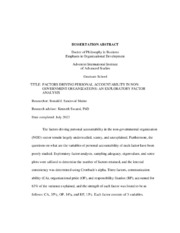| dc.description.abstract | The factors driving personal accountability in the non-governmental organization (NGO) sector remain largely understudied, scanty, and unexplained. Furthermore, the questions on what are the variables of personal accountability of each factor have been poorly studied. Exploratory factor analysis, sampling adequacy, eigenvalues, and scree plots were utilized to determine the number of factors retained, and the internal consistency was determined using Cronbach’s alpha. Three factors, communication ability (CA), organizational pride (OP), and responsibility fixation (RF), accounted for 63% of the variance explained, and the strength of each factor was found to be as follows: CA, 35%; OP, 14%; and RF, 13%. Each factor consists of 3 variables.
The findings of this study may contribute to expanding the body of knowledge in the literature on personal accountability in five ways: (a) creating avenues for staff to develop their communication ability; (b) ensuring that the organization behaves in ways that allow staff to feel proud of being part of said organization; (c) fixing personal responsibility to promote personal accountability; (d) understanding that the positive relationship between 3 demographics characteristics, namely, years of NGO experience in the current NGO, the continent of origin, job position, and promote personal accountability; and (e) emphasizing that personal accountability in the NGO sector is the position in the leadership function rather than the management function. This study offers recommendations and directions for researchers. Since an exploratory factor analysis was used to group the factors leading to identifying the CA, OP, and RF factors, more data should be collected for confirmatory factor analysis. Also, since the 3 drivers of PA can only explain 63% of the variance of PA, further studies should be used to investigate other factors that can explain the missing 37% of the variance of PA. Finally, further research is recommended to identify whether the findings for PA within NGOs are true for other sectors and, if not, explain why this is so.
Subsequently, one of the insights derived from the demographic findings of this study is the discussion of whether PA is job-related or intrinsic to the person. Thus, further studies should be done in this area to see whether the researcher’s position based on these findings is valid (i.e., PA is intrinsic to the person but is illustrated via the position that the practitioner is in). Hence, even though PA is demonstrated as job-related, it is fundamentally a personal matter. | en_US |

